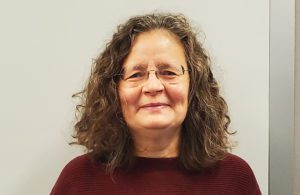
Betty Howard [Photo courtesy of STERIS Applied Sterilization Technologies]
Betty Howard has more than 30 years in the medtech industry and disciplines.
She began her career with Public Health RD bench testing and virology, moving through Drug Discovery and new product assessment and applications development, and technical support and education across a variety of Biological Sciences and Chemistry areas. Betty currently supports irradiation sterilization technologies, validations and problem solving, a role she has held for nearly 20 years.
What first drew you to medtech? When did you first know you wanted to be in the industry?
Howard: To me the definition of medtech wasn’t anything to considered or firmly defined. All my positions and focuses have been related to Biology, and support of safety and health care needs. With each position or each class taken you learn more skills, and the beauty of Medtech is you can apply all of the things learned and experiences every day to solve problems or support products that touch millions of people.
What projects, past or present, have made you love what you do?
Howard: I love what I do because each day I believe I help someone move their project or product one step closer to helping others. All who touch a product or technology can feel, even if on a small part, they are part of those products. I also see a lot of products and technologies very early at times, and still am amazed at what science can achieve.
What are some of the barriers women face in today’s medtech industry, if any? Women have made advances much more rapidly in recent years, but sadly still need to catch up and need to take more steps still to advance or be seen as valuable. We can all give examples where we felt gender played a role in a decision, but I prefer to look forward at the amazing things that are to come.
Talk about your leadership skills. What is the most important lesson you have learned that has guided you in your career?
Howard: The most important lesson I’ve learned is you must challenge people to use the skills they are developing, using all the experiences you’ve had the privilege to gain. Also, remember that not everyone learns the same way.
Describe your biggest leadership challenge. How did you conquer it or resolve it, or what was the outcome?
Howard: The hardest part is convincing others of the financial value to an organization of having a strong scientist development program, not just a seminar and a quiz, but development of analytic / problem solving skills. Also, that these disciplines can apply across many other disciplines in an organization.
In your opinion, what more can be done to promote greater participation of young women in the medtech industry today?
Howard: This is probably the easiest question here. Expose young girls to science. Don’t focus on the cost or number of years of education, or assume girls will not like something. Make it fun. Children of all ages have a wonder of the world around them; they question everything around them. Scientists never stop asking questions. Learning how things work can be just as exciting to girls as boys. When you are interested in something, the tools you need to learn more about it are not a penalty, they are gifts. In general, we should all focus on a family as a team, not just one member of a family doing defined functions.
Why is it important for companies to be more inclusive and have more women in charge?
Howard: Everyone brings experience to the table. Diversity of opinions and seeing other viewpoints of a problem are critical to building a strong successful company. Seeing others like you that are successful lets women know that can achieve anything they want. This will provide companies with more options for any function needed in an organization.